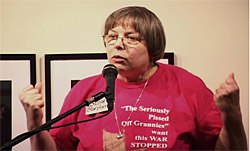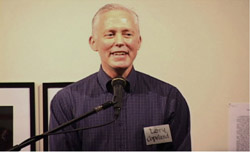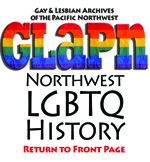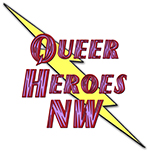Queer Heroes NW 2012
Portland Town Council
Portland Town Council (PTC), founded in 1974, was the first LGBT umbrella group in Oregon dedicated to civil rights for lesbians and gay men. Three of the early PTC powerhouses all (independently) nominated each other for Queer Heroes NW, and they’re sharing a poster for Queer Heroes NW!
Susie Shepherd
by Jerry Weller
 Susie Shepherd was one of the first Oregon lesbians to fully embrace mainstream legislative politics as a means to achieve equality for the lesbian, gay, bisexual and transgender community. She has continued this work and expanded upon it throughout the years of her life. Susie's dedication to the LGBT community earns her a heroes award from the Q Center.
Susie Shepherd was one of the first Oregon lesbians to fully embrace mainstream legislative politics as a means to achieve equality for the lesbian, gay, bisexual and transgender community. She has continued this work and expanded upon it throughout the years of her life. Susie's dedication to the LGBT community earns her a heroes award from the Q Center.
In 1975 she joined the board of Portland Town Council (PTC) the first LGBT umbrella group in Oregon dedicated to civil rights for lesbins and gay men. Also in 1975-76 she spearheaded the writing of a PTC booklet entitled "A Legislative Guide to Gay Rights" which was aimed at educating policy makers on the gay issue. The booklet was 76 pages and won rave reviews in the national gay press. It was sold in LGBT bookstores across the US and from England to Australia.
By 1977 she was Oregon's first paid female LGBT civil rights worker accepting the second position created at Portland Town Council. From this position Susie not only organized Oregonians for legislative hearings but also provided assistance to the No on 51 Campaign which was fighting a gay rights ballot measure in Eugene in 1978.
In addition to this position in 1978 Susie joined the board of the newly organized P.T.C. Political Action Committee. This was first LGBT political action committee in Oregon and only the second in the nation. Susie was also the first openly gay member of the board of the Oregon Council for Women's Equality and the Oregon Women's Political Caucus. As AIDS became an issue in Oregon Susie was there working with Cascade AIDS Project as a Personal Active Listener helping her gay brothers to cope with this new reality.
In 1989 Susie proved herself a leader again by winning the Portland Leatherwoman competition and later that year she won International Ms. Leather. Susie used these positions to fundraise both locally and nationally for gay causes. She raised over $60,000.
In 1993 the Bill and Ann Shepherd Legal Scholarship Fund of Equity Foundation was formed in honor of Susie's parents. Susie has chaired that committee since 1997 organizing A Class Act, the group's major fundraiser, every year since then. The group funds scholarships for third and fourth year law students dedicated to fighting bigotry and discrimination, particularly on the basis of sexual orientation and gender identity. The fund has provided over $100,000 in scholarships.
From 1997 through 2003 Susie served as secretary of the Oregon Gay and Lesbian Law Association (OGALLA) and is still active with the group. Additionally, Susie served as secretary of the Portland PFLAG, an organization co-founded by her parents, and she served on the Blanche Fischer Foundation board, which assists physically disabled Oregonians.
Susie is my hero for all her years of dedicated work for the community and for the many organizations she served.
Larry Copeland
by George Nicola
 Larry Copeland says he had been apolitical up to late 1974. That changed when he attended a Portland City Council hearing on the proposed resolution opposing sexual orientation discrimination in city employment.
Larry Copeland says he had been apolitical up to late 1974. That changed when he attended a Portland City Council hearing on the proposed resolution opposing sexual orientation discrimination in city employment.
Although the resolution passed, Larry’s witness of the antigay testimony pulled him into activism. He became a founding member of the Portland Town Council (PTC), one of Oregon’s earliest gay civil rights organizations. He was office coordinator from 1974 to 1976, working full time with no pay. He helped conduct small fund raisers, and even ran a thrift shop whose proceeds went to support PTC’s efforts.
It was during this period that Larry often slept all night on the floor of the PTC office, so that he would not miss a single call from a suicidal gay person. We literally will never know how many lives Larry single-handedly saved that way.
In 1975, Larry approached State Ombudsperson Gladys McCoy, to ask if then-Governor Robert Straub would appoint a task force to study whether discrimination really existed in Oregon based on sexual orientation. Ms. McCoy worked closely with Larry to convince the governor that this study was needed, and Larry hand-picked a blue-ribbon committee which Governor Straub then appointed to meet monthly, and report its findings to the 1977 legislature. Not surprisingly, the committee, which met in all corners of the state, found overwhelming evidence of anti-gay discrimination. The committee was met at every meeting by opponents of gay equality, which only reinforced their commitment to the cause.
Larry had an idea in 1975 for a brochure he wanted to hand to each member of the 1977 legislature. He wanted to call it A Legislative Guide to Gay Rights. At the suggestion of PFLAG co-founder Rita Knapp, Larry asked Susie Shepherd to write this piece. The brochure evolved into a soft-bound book with major contributors from the fields of education and religion. The Guide won rave reviews in the national gay press, and was forced into a second printing.
In 1982, Larry became the first openly gay person to seek public office when he ran for City Council to raise awareness of gay issues. Larry is retired from politics and work today, but he stands as one of the great pillars that helped create Oregon’s now powerful LGBT movement.
Jerry Weller
by Susie Shepherd
Jerry bridged the earliest days of Oregon's gay civil rights movement into the second, truly visible stage of the movement. From 1976 - 1983, he served as Executive Director of Portland Town Council, the first and only mainstream LGBT rights organization in Oregon, and the Town Council Foundation—one of the first eight lesbian and gay tax-exempt organizations recognized by the IRS. The Foundation later changed its name to Phoenix Rising, a LGBT counseling center. Cascade AIDS Project originated as a committee of Phoenix Rising. In 1978, Jerry served as co-chair of the finance committee for Eugene’s No on 51 campaign with Terry Bean. Jerry coordinated Portland's fundraising effort, raising over $60,000--an unheard -of amount for a ballot measure in those days.
During this time, Jerry also served on the national level, as co-chair of the Gay Rights National Lobby for three terms. In 1982, Jerry was co-founder and chair of the Right to Privacy Political Action Committee, which became the major driving force for LGBT legislation in Oregon.
Jerry worked tirelessly to attract and coalesce nongay support for our civil rights legislation, orchestrating testimony for omnibus equality bills in the legislature, volunteering on countless legislative and other political campaigns, and wearing out many pairs of sneakers going on bar tours to educate our community--which at that time did exist visibly primarily in the bars. In January 1978, he did what was then unthinkable and arranged for a gay person to address the City Club of Portland. Women had barely been allowed membership into that elite group at that time, and Jerry brought The Rev. Troy Perry, founder of U.F.M.C.C., from Los Angeles to the City Club. Rumors flew that no one would show up to hear a gay man address the Friday Weekly Forum; instead, the Benson Hotel had to bring in extra chairs for the SRO audience.
Jerry orchestrated speakers for the live Sunday television show "Town Hall" in May 1977 on the topic of homosexuality. This particular showing ended up winning The Oregon Broadcasters' Award in its category that year, and broke down more closet doors in the Portland metropolitan area than any event for years on either side. Portland Town Council phones rang off the hook for days after, and Parents of Gays (later to become PFLAG) got its first public airing from that show--and a flood of new members. Jerry was the first gay activist in Portland to utilize the press on a regular basis--to keep our cause in people's faces week in and week out.
In summer and fall of 1978, Jerry was once again chosen to do the impossible--to run a judicial campaign against a seated judge. At that time, there were only four family law judges on the Multnomah County bench, none of whom was friendly to the gay cause, and one of whom had actively worked to slow our progress. Attorney Kathleen Nachtigal took a lot of flack from her conservative Republican friends for hiring an openly gay man to run her campaign, but when she unseated her opposition 3 to 1, they all lost a solid hunk of homophobia. Jerry's depth of vision, matched only by his passion for our people and his boundless energy, truly put Portland and Oregon on the path for equality.
When Jerry left Portland in 1983, he moved to Washington, D.C., to become Executive Director of the Gay Rights National Lobby, which at the time was the only LGBT lobbying organization serving on the national level. Jerry was also the co-founder and founding board member of the Human Rights Campaign. Jerry moved to Chicago in 1984 to serve as Executive Director of the Howard Brown Memorial Clinic in Chicago, the nation’s largest LGBT health clinic, during the first years of the AIDS epidemic.
We are blessed to have Jerry Weller back in Portland, advising on projects and lending his expertise to campaigns. He absolutely embodies everything a Queer Hero should be.
P.O. Box 3646 • Portland, OR 97208-3646 • info@glapn.org
Copyright © 2015, Gay & Lesbian Archives of the Pacific Northwest


